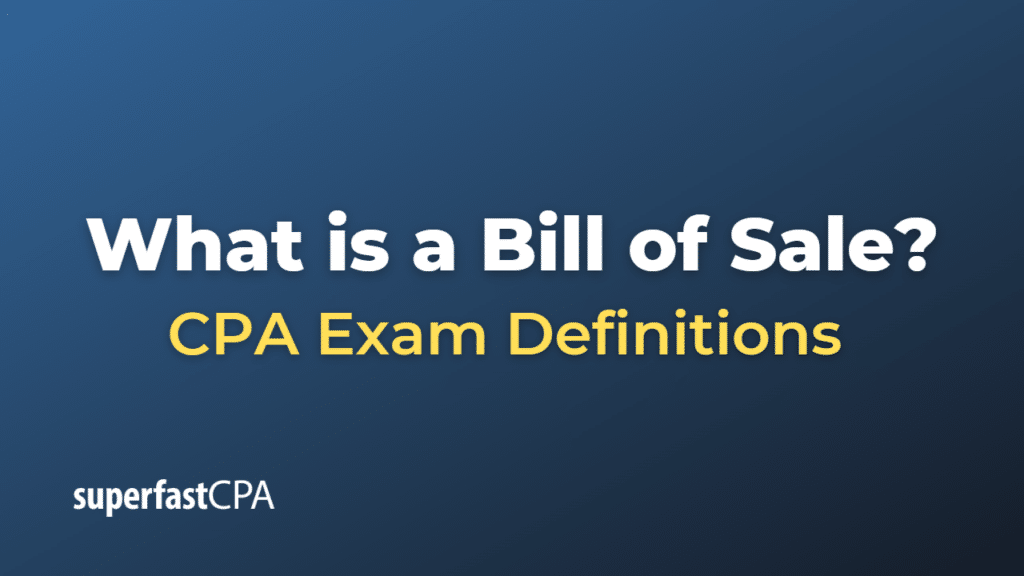Bill of Sale
A bill of sale is a legal document that serves as a written record of the transfer of ownership of personal property, such as vehicles, boats, appliances, or furniture, from one party (the seller) to another (the buyer). It is commonly used in private sales transactions to provide proof of purchase and protect both parties’ interests in case of disputes or future issues related to the transaction.
A bill of sale typically includes the following information:
- Buyer and Seller Information: The names, addresses, and contact details of both the buyer and the seller.
- Description of the Item: A detailed description of the item being sold, including make, model, serial number, vehicle identification number (VIN), color, size, or other relevant characteristics.
- Purchase Price: The agreed-upon price for the item being sold, typically expressed in the local currency.
- Payment Method and Terms: The method of payment used for the transaction (e.g., cash, check, bank transfer) and any terms or conditions related to the payment, such as installment plans or financing arrangements.
- Date of Sale: The date on which the transaction takes place.
- Condition of the Item: A description of the item’s condition at the time of sale, including any known defects, damages, or issues that the buyer should be aware of.
- Warranty Information: Any warranty or guarantee provided by the seller, if applicable, or a statement indicating that the item is being sold “as-is” without any warranty.
- Signatures: The signatures of both the buyer and the seller, confirming their agreement to the terms of the sale and the transfer of ownership.
Depending on the jurisdiction and the type of property being sold, a bill of sale may need to be notarized or filed with a government agency, such as the Department of Motor Vehicles (DMV) for vehicle sales. It’s essential to check local laws and regulations to ensure that the bill of sale meets all legal requirements.
A bill of sale is an important document that helps protect both buyers and sellers in private sales transactions, providing clear evidence of the change in ownership and the terms of the agreement. It can also be used for tax purposes, insurance claims, or legal disputes related to the transaction.
Example of a Bill of Sale
Let’s consider a hypothetical example to illustrate how a bill of sale might be used in a real-world transaction.
Suppose John wants to sell his used car to Jane, a private buyer. They agree on a purchase price of $5,000, and John prepares a bill of sale to document the transaction. The bill of sale would include the following information:
- Buyer Information:
Name: Jane Smith
Address: 123 Elm Street, Springfield
Contact: (555) 123-4567 - Seller Information:
Name: John Doe
Address: 456 Oak Street, Springfield
Contact: (555) 987-6543 - Description of the Item:
Vehicle Make: Toyota
Vehicle Model: Corolla
Vehicle Year: 2015
Vehicle Identification Number (VIN): 1A2B3C4D5E6F7G8H9 - Purchase Price: $5,000
- Payment Method and Terms: Cash payment in full at the time of sale.
- Date of Sale: April 21, 2023
- Condition of the Item: The vehicle is in good used condition, with normal wear and tear. The buyer has been made aware of a small scratch on the rear bumper and a missing hubcap on the front passenger side wheel.
- Warranty Information: The vehicle is being sold “as-is” without any warranty or guarantee.
- Signatures:
Buyer: Jane Smith
Seller: John Doe
In this example, the bill of sale serves as a legal record of the transaction, providing clear evidence of the change in ownership, the terms of the agreement, and the condition of the vehicle at the time of sale. Jane can use this document to register the vehicle in her name and obtain insurance coverage. Additionally, both parties have written proof of the transaction to protect their interests in case of any disputes or issues that may arise in the future.













